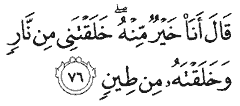Fire and Clay, Moment of Misfortune, Circle of Control
Issue 618 » January 28, 2011 - Safar 23, 1432
Living The Quran
Fire and Clay
Sad (Sad) - Chapter 38: Verse 76
 "(Iblis) answered: "I am better than him. You have created me from fire and him, You have created from clay."
"(Iblis) answered: "I am better than him. You have created me from fire and him, You have created from clay."
According to Iblis (Satan), honour and goodness lie in physical origin or matter. His attitude is typical of materialism and represents a lack of correct understanding. He saw only the material origin of humankind and ignored their spiritual dimension that originated in being breathed into out of God's Spirit.
Iblis also judged God's order according to his own knowledge and understanding, and opposed God's explicit order based on his own judgment. He demonstrated that, out of ignorance, he would fulfill God's orders only when they conformed to his desire or understanding, not because he believed all of these orders to be truths in themselves, and that they must be obeyed. So are those who act in the same way aware who it is that they follow, and whose pupils they are?
Compiled From:
"The Quran: Annotated Interpretation in Modern English" - Ali Unal, pp. 943
Understanding The Prophet's Life
Moment of Misfortune
Both Bukhari and Muslim relate that God's Messenger, peace be upon him, said: "Patience is shown at the moment of misfortune."
Patience is a key to success and triumph. It means to accept pain, trouble, misfortune, and similar unpleasant facts without complaint, or loss of self-control, trust, or belief in God and Destiny.
There are several kinds of patience:
- Determination to avoid sins. This elevates one to the rank of the God-fearing, whom God takes into His care.
- Constant and regular worship of God. This causes one to acquire the rank of being a beloved of God.
- Acceptance of misfortune without complaint. This causes one to be included among the people of patience and those who put their trust in God.
- Dealing with exasperation. This means having a realistic understanding of what is required to achieve a specific result. For example, producing a loaf of bread requires that the field be cultivated, the crop harvested, the grain taken to a mill, and the dough shaped into loaves and baked in an oven.
Compiled From:
"The Messenger of God: Muhammad" - Fethullah Gulen, p. 106
Blindspot!
Circle of Control
We can't control everything that happens to us. We can't control the colour of our skin, who will win the NBA finals, where we were born, who our parents are, or how others might treat us. But there is one thing we can control: how we respond to what happen to us. And that is what counts! This is why we need to stop worrying about things we can't control and start worrying about things we can.
Picture two circles. The inner circle is our circle of control. It includes things we have control over, such as ourselves, our attitudes, our choices, our response to whatever happens to us. Surrounding the circle of control is the circle of no control. It includes the thousands of things we can't do anything about.
Now, what will happen if we spend our time and energy worrying about things we can't control, like a rude comment, a past mistake, or the weather? You guessed it! We'll feel even more out of control, as if we were victims.
Productive people focus on things they can control. By doing so they experience inner peace and gain more control of their lives. They learn to smile about and live with the many things they can't do anything about. They may not like them, but they know it's no use worrying.
Compiled From:
"The 7 Habits of Highly Effective Teens" - Sean Covey, p. 54-56